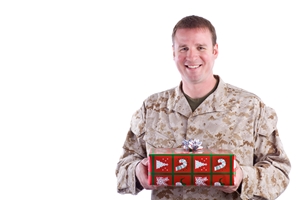With Christmas only a few days away, images of servicemembers deployed overseas wearing Santa hats and preparing tremendous holiday feasts are once again growing popular. Families with sons, daughters, husbands and fathers away from home will miss them dearly, but they'll take comfort in being able to talk to them and see their distant celebrations.
But they may be curious – how did the soldiers of history celebrate the year's merriest holiday?
The Civil War
It may be difficult to imagine what Christmas may have looked like in the later-half of the 19th century, but really, it wasn't celebrated so very differently than how it is today. The holiday standbys – like giving gifts, decorating trees and singing Christmas carols – were already popular. "A Christmas Carol," Charles Dickens' famous work, had been published in 1843. According to Civil War Trust, the first truly new tradition to appear in the Civil War was the modern idea of a round, red-jacketed Santa Claus.
Soldiers away from home made sure that their camps didn't forget the festive spirit. Some put trees up in their tents, using pork and biscuits for ornaments rather than fruits and cakes. On Christmas Eve, one soldier of the 17th Maine wrote that "It is rumored that there are sundry boxes and mysterious parcels over at Stoneman's Station directed to us. We retire to sleep with feelings akin to those of children expecting Santa Claus."
Not everything was jolly. Southern families faced severe supply restrictions, and some parents told their children that the Union blockade might keep Santa out altogether. Others wished for the comforts of home while facing the harsh winter cold. Still, the holiday was an escape for many men on both sides. A day of merry rest in war was, and still is, always appreciated.
World War I
There were few conflicts more vicious or terrifying than World War I, but on Christmas Day in 1914, the roar of exploding shells and the clatter of machine guns faded mercifully from the battlefields of the Western Front just in time for the holiday. The truce originated in a suggestion from Pope Benedict XV a few weeks prior. Benedict reached out to the warring nations seeking a Christmas cease-fire. No one nation would commit, so the opposing soldiers took it upon themselves to do so.
On Christmas Eve, under the clean light of the moon and amidst the smoke and the frost, the sound of singing rang through the air. According to Time, British and German troops kicked off the unofficial truce with songs bellowed back and forth from their trenches. Graham Williams of the Fifth London Rifle Brigade remembered the night in detail.
"First the Germans would sing one of their carols and then we would sing one of ours," said Williams, "until when we started up "O Come, All Ye Faithful' the Germans immediately joined in singing the same hymn to the Latin words Adeste Fideles. And I thought, well, this is really a most extraordinary thing – two nations both singing the same carol in the middle of a war."
Extraordinary indeed. It became even more so the next morning, when at first light unarmed German soldiers crossed into no-man's land calling out "Merry Christmas" in English. At first deception was feared, but the British clambered out of their trenches and met their enemy with handshakes. Presents – the soldier standbys of cigarettes and sweets – were exchanged.
The Christmas Truce, as it came to be called, happened only five months after the war broke out in Europe. It was an unbelievable moment of chivalry and shared humanity – one never again to be repeated. Still, for a brief few days, men at war proved that not even bullet and cannon can destroy the spirit of Christmas.

